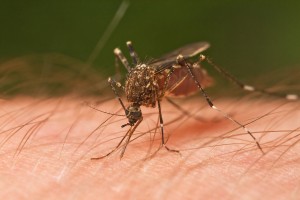Communities ready for the yearly mosquito battle
Judy Harvey — June 22, 2015
Mosquito control poses a yearly summer challenge to local communities and with heavy rains and flooding in recent weeks the chances are high of an increased mosquito population in the Kendall County area. Photo by JJ Harrison
The Chicago area this spring gained the dubious distinction of being named one of the worst places for mosquitoes in the country, according to a national pest control survey of customer calls.
Not only are they pesky, leaving behind small, itchy welts to those who get a poke from the tiny insects, mosquitoes can transmit some serious diseases, including West Nile Virus. Last year, more than 40 human cases of the virus were confirmed in Illinois and four of those were fatal, according to the Illinois Department of Public Health.
Mosquito control poses a yearly summer challenge to local communities and with heavy rains and flooding in recent weeks the chances are high of an increased mosquito population in the Kendall County area.
So, what are Kendall County municipalities plans for dealing with the annual pest? Many communities contract with Clarke Environmental Mosquito Management, Inc. (www.clarke.com).
Clarke says it puts environmental safety first and foremost in its abatement programs. It’s EarthRight program is the “first and only public health mosquito control program to utilize products listed with the Organic Materials Review Institute,” the company states.
The Organic Materials Review Institute (www.omri.org) provides an “independent review of products intended for use in certified organic production, handling, and processing,” according to its web site. OMRI is a 501(c)3 nonprofit organization founded in 1997.
By being OMRI listed, Clarke states both the larvicide and adulticide are recognized as being safe to use in the vicinity of organic crops and gardens.
The village of Montgomery is taking “a two-prong’ community-wide mosquito abatement program. The first part involves both truck-spray and helicopter applications that target both mosquito larvae and adults, according to the village
The second part of the plan involves the placement of larval control briquettes in street puddles, ditches, low-lying floodwater areas and other places of stagnant water that are conducive to mosquito breeding. “These briquettes are placed by public works employees licensed through the Department of Agriculture specifically for mosquito control,” the village states on its web site..
Like Montgomery, the village of Oswego also contracts with Clarke Environmental and describes their plan as a “sophisticated abatement program.” The program includes using mosquito traps for monitoring numbers of insects, prevention of larval mosquito development in stormwater catch basins, and employing insect-eating fish in detention basins, according to the village
Oswego will move to adult mosquito control once the count elevates, the village states, calling it the “the most effective method” for controlling mosquitoes populations and the spread of the West Nile Virus.
Several years ago, the city of Yorkville ceased using the spray trucks because it was found to be “not too effective and expensive,” said Bart Olson, city administrator.
Instead, working with Clarke, Yorkville places pellets and or briquettes into inlets and basins throughout the city and takes a natural approach to promote biodiversity in the area, boosting natural predators to the mosquito population, Olson said.
West Nile Virus is transferred when mosquitoes that have bitten a bird carrying the virus then bite a human. For humans, mosquitoes pose the only risk for contracting the virus as it is not spread between people or by coming into contact with birds.
That is why municipalities place such an effort on keeping the local mosquito populations at bay. It is more serious than just getting rid of a summertime pest that can be bothersome at outdoor events.
Residents also are asked to do their part by taking necessary precautions at their homes and businesses.
Homeowners and businesses should check all buckets and containers outside for standing water and empty them as often as possible. Once they are emptied, the containers should be turned upside down so that water is not trapped again.
People with bird paths should change the water at least once a week and keep roof gutters clean and free of debris.
Mosquitoes like to hide in the longer grass so keeping lawns close cropped by mowing them often gives them one less place to breed, according to Clarke Environmental.
For residents wanting to be placed on a call notification list they can call Clarke’s Mosquito Hotline at: (800) 942-2555.
West Nile Virus facts, prevention
- Use insect repellent on exposed skin when you go outdoors. Use an EPA-registered insect repellent with DEET, picaridin or oil of lemon eucalyptus.
- When weather permits, wear long-sleeves, long pants and socks when outdoors. Mosquitoes may bite through thin clothing, so spraying clothes with repellent will give extra protection. It is best to not spray repellent on the skin under your clothing.
- Be aware of peak mosquito hours, which are usually dusk to dawn. Take extra care to use repellent and protective clothing during evening and early morning or consider avoiding outdoor activities during these times.
- Drain standing water
Mosquitoes lay their eggs in standing water. Limit the number of places around your home for mosquitoes to breed by getting rid of items that hold water.
- Some mosquitoes like to come indoors. Keep them outside by having well-fitting screens on both windows and doors. Offer to help neighbors whose screens might be in bad shape.
- Report dead birds to the Kendall County Health Department in case the bird is infected with the West Nile Virus by calling (630) 553-9100, Ext. 8026.



